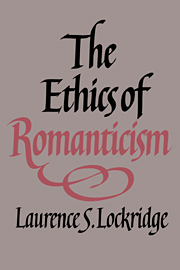4 - The tragic Wordsworth
Published online by Cambridge University Press: 16 September 2009
Summary
We have seen that Blake and Coleridge, despite some radical differences, share concepts of the moral life. Both emphasize the relationship of certain mental powers within the agent. A psychodynamic unity of these powers is normative and empowering, even though Blake favors some powers over others, and Coleridge thinks one must arduously negotiate the evil personal will. Human feeling is but one component, positioned and even disciplined, within this larger structure. Despite the importance of psychological health to moral functioning, Blake and Coleridge are “non-naturalists” with respect to moral judgment and truth: ethics cannot be translated into non-moral, factual categories derived from natural observation, science, psychology, or sociology. They dislike the moral implications of empirical psychology – especially its compromise of human freedom – and they elevate some powers – imagination, will, higher reason – to suprapsychological status. The potential for radical freedom, however thwarted from without and within, makes theirs a voluntaristic ethics in the sense that human beings can and should originate their own acts and gain power over nature and social environment.
Wordsworth does not conform to very much of this. Not so preoccupied with unity and structure (and in this he is joined by the other major figures in this study), he gives the affective life greater prominence as both norm and fact, and hesitates to treat the conative life as its equal. Hardly peripheral, willing and acting are still secondary to feeling in both the critical writings and the poetry of Wordsworth.
- Type
- Chapter
- Information
- The Ethics of Romanticism , pp. 206 - 248Publisher: Cambridge University PressPrint publication year: 1989

